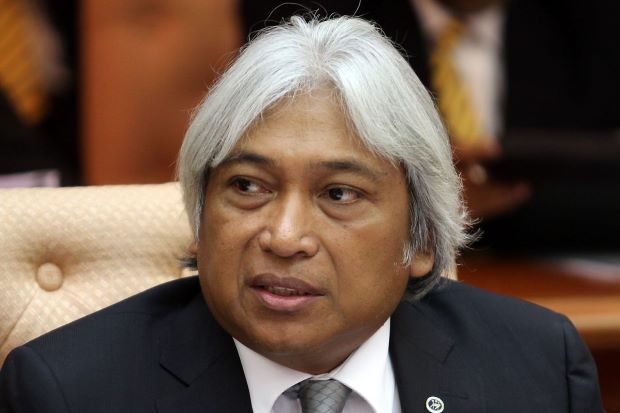Will Malaysia’s new central bank governor stand up to the prime minister and put an end to the 1MDB scandal?
At a time when the country is mired in an unprecedented scandal that involves prime minister Najib Abdul Razak and a state-owned investment company, 1 Malaysia Development Berhad (1MDB), the selection of an insider to take over the post of Bank Negara governor is possibly the best outcome many Malaysians could have hoped for.
But questions remain. Many will wonder whether the new governor Muhammad Ibrahim can stand up against Najib and execute his duty without fear or favour, particularly since he was effectively appointed by the prime minister he may have to investigate.
Mr Muhammad was the deputy governor of the central bank and the only contender working within the institution. Other candidates were either politicians or technocrats within the executive whom observers worried could directly undermine the independence of the bank.
Bank Negara had been investigating the 1MDB scandal since 2015. But they faced resistance from the executive in pursuing criminal charges against the state company, which Mr Najib is its advisory board chief.
Though the outgoing governor Zeti Akhtar Azizi had hoped to bring closure to the 1MDB case before her retirement, more and more damaging details about the state company and the mysterious funds that flowed into Mr Najib’s personal accounts have been uncovered in recent weeks.
In a report this March, ABC’s Four Corners revealed that the central bank was repeatedly warned about the prime minister’s unexplained wealth, totaling up to US$1 billion, by local bank officials. But, it was understood that Dr Zeti had handed back the ‘highly sensitive’ report, not wishing for Bank Negara to keep a copy on its premises. Dr Zeti refused to comment on the allegation.
Be that as it may, Dr Zeti is still widely respected for professionalism and independence in her 16 years as Bank Negara governor. But, with her term set to end, opposition members and civil society were increasingly worried that Mr Najib, who is also the finance minister, would use his power to recommend a confidant to take the helm at the bank.
Mr Najib carried out a similar act in July 2015. In a sudden move that was widely believed to pre-empt possible graft charges against him, The PM removed the then attorney general and replaced him with a federal judge who has a close relationship with the ruling coalition.
In a similar vein, The Wall Street Journal last month quoted sources claiming that Irwan Serigar Abdullah, a top official in Najib’s finance ministry, was expected to be named as the new central bank governor, but this did not materialise. Mr Irwan also sits on the advisory board of 1MDB.
By selecting a Bank Negara insider, Najib’s government is seeking to assure the market of the bank’s continuity and stability when it comes to monetary policy and banking oversight. But this is unlikely to remove all concerns regarding government interference in the bank, given Mr Najib’s interest in the 1MDB scandal.
Mr Muhammad’s first task as the new governor will probably be dealing with the problematic 1MDB fund, given the state company has recently defaulted an interest payment due to a stand-off with Abu Dhabi sovereign fund International Petroleum Investment Company (IPIC). This could have a huge impact to Malaysia sovereign ratings.
But his biggest test lies with whether he is willing to and capable of pursuing the 1MDB investigation further. Despite the fine announced by Bank Negara on 29 April for various charges contravening the country’s foreign exchange law, there are still many key issues that haven’t been dealt with, particularly the flow of Mr Najib’s unexplained wealth over the border.
This is where the independence of the new governor will be tested.
Teck Chi Wong is a former journalist and editor with Malaysiakini. He is currently pursuing a Master of Public Policy at the Australian National University’s Crawford School of Public Policy.
 Facebook
Facebook  Twitter
Twitter  Soundcloud
Soundcloud  Youtube
Youtube  Rss
Rss 